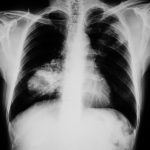 Lung cancer is a form of cancer that starts in the lungs. In the early stages, there may not be any signs or symptoms. A history of smoking definitely contributes to a higher risk of being diagnosed with the disease, though non-smokers also can develop lung cancer. Smoking causes cancer by irritating the lining of the lungs. This causes changes in the lung tissue. It is believed that the effects of smoking may be reversible in the very early phases but repeated exposure to the chemicals found in smoke will eventually be irreversible.
Lung cancer is a form of cancer that starts in the lungs. In the early stages, there may not be any signs or symptoms. A history of smoking definitely contributes to a higher risk of being diagnosed with the disease, though non-smokers also can develop lung cancer. Smoking causes cancer by irritating the lining of the lungs. This causes changes in the lung tissue. It is believed that the effects of smoking may be reversible in the very early phases but repeated exposure to the chemicals found in smoke will eventually be irreversible.
Signs and Symptoms of Lung Cancer include:
- A cough that doesn’t get better
- Coughing up blood
- Shortness of breath
- Chest pain
- Wheezing
- Hoarseness
- Headache
- Weight loss that isn’t intentional
There are two types of lung cancer based on their appearance under the microscope:
- Small cell is the most common type of lung cancer and is found in heavy smokers.
- Non-small cell is a group of other types of lung cancers that act similarly. This group includes squamous cell carcinoma, adenocarcinoma, and large cell carcinoma.
Lung cancer staging
Stage 1
- The cancer is limited to the lung.
- Tumor is smaller than 2 inches
- has not spread to lymph nodes
Stage 2
- Usually larger than 2 inches
- Spread to lymph nodes
- Possible spread to pleura, chest wall and diaphragm
Stage 3
- Involves spread to other organs
- Found in distant lymph nodes
Stage 4
- Spread from one lung to another
- Spread to distant parts of the body
If lung cancer is suspected, a few tests to make the diagnosis definitive will be ordered. A chest x-ray will be performed and if there are any lesions found on the lung a CT scan will be performed to get a better view of the lungs. An exam of the sputum can sometimes reveal lung cancer cells and to complete the diagnosis a lung biopsy will be done to examine the cells to see if they are cancerous.
Depending on the stage of cancer, treatment options vary and can include chemotherapy, radiation and / or surgery. A common surgical option is called a lobectomy, removing one of the lobes of the lung.
If you would like to discuss lung cancer and treatment options with a physician at Flushing Hospital, please call 718-670-5486.
All content of this newsletter is intended for general information purposes only and is not intended or implied to be a substitute for professional medical advice, diagnosis or treatment. Please consult a medical professional before adopting any of the suggestions on this page. You must never disregard professional medical advice or delay seeking medical treatment based upon any content of this newsletter. PROMPTLY CONSULT YOUR PHYSICIAN OR CALL 911 IF YOU BELIEVE YOU HAVE A MEDICAL EMERGENCY.
